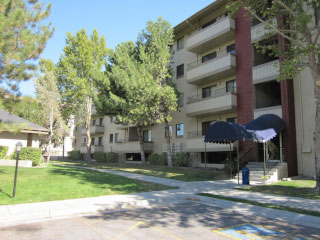I’m 21 and pursuing the path to financial independence
This article written by Cody is part of the "money stories" feature at Get Rich Slowly. Some stories contain general advice; others are examples of how a GRS reader achieved financial success -- or failure. These stories feature folks from all stages of financial maturity.
In January, I attended Camp FI in Florida. While most of the attendees were thirty- or forty-somethings pursuing early retirement, one young man stood out. We were all amazed at the presence of Cody Berman, a 21-year-old hustler who defies the Millennial stereotype. Cody works hard, saves tons, and has a vision for his future. I asked if he'd be willing to share his story with GRS readers. Here it is.
From a young age, my parents instilled the value of saving into me. Throughout my early childhood, my father would match my contributions to my savings account dollar for dollar. This made me excited to save birthday money and miscellaneous earnings because the money would double. (Thanks, Dad!)
I bought a foreclosure house on the courthouse steps
This article is written by Naomi Mannino. Naomi is a freelance consumer personal finance and health journalist who reports on health, medical and personal finance news and how it will affect your life today. You can follow Naomi on Twitter @naomimannino.
Some reader stories contain general advice; others are examples of how a GRS reader achieved financial success or failure. These stories feature folks with all levels of financial maturity and income.
Can you really buy a house at auction on the courthouse steps for $100? Do you have to spend hundreds of thousands of dollars as the house-flipping guys do on TV?
The shocking truth about medical bills that can save you thousands
This reader story is by a longtime GRS reader Sumitha from afineparent.com, a blog founded on the simple belief that "Good Parents Are Made, Not Born."
Some reader stories contain general advice; others are examples of how a GRS reader achieved financial success or failure. These stories feature folks with all levels of financial maturity and income.
How much would you think it would cost to treat an ant bite?
Costs and savings of having a stay-at-home parent
This post comes from Lynn Svenson, who blogs at The Photographer's Wife. Some reader stories contain general advice; others are examples of how a GRS reader achieved financial success or failure. These stories feature folks with all levels of financial maturity and income.
One of the biggest impacts to my wallet (and heart) this past year was having a baby. Of course, there are plenty of expenses that go along with being pregnant and having a baby, like numerous visits to the doctor and the enormous amount of diapers. But in particular, I want to share how making the decision to have a stay-at-home parent has affected our wallets and our way of thinking.
We were overjoyed when we found out I was pregnant in the fall of 2011. However, along with that joy came some sadness. After taking a look at our finances, we realized we wouldn't be able to achieve one of our long-time goals of my husband staying home to raise our children. We do have debt, and my salary alone just wouldn't cut it. We ultimately took a big risk when we decided that my husband would stay home and I would bust my butt to get a new, higher-paying job after the baby was born.
10 financial lessons I learned from my parents’ divorce
This article written by Sydney is part of the “reader stories” feature at Get Rich Slowly. Sydney blogs about personal finance, entrepreneurship, self improvement, travel and lots of other fun stuff on Untemplater.com. Some reader stories contain general advice; others are examples of how a GRS reader achieved financial success or failure. These stories feature folks with all levels of financial maturity and income.
It's hard to believe it's been about 20 years since my parents first separated, and it's actually a blessing it happened when it did. No parent ever wants to put his or her child through the nastiness, heartache and sadness that comes with divorce, but having lived through my parents' split, I can tell you that it actually can be the best option.
When I was a kid, I didn't understand why my parents couldn't get along. Neither one of them was mean or evil; they didn't cheat on each other. They had jobs, loved me, supported my interests and activities, and they didn't seem that different from my friends' parents. Well, except for the arguing. It got really nasty toward the end of their marriage. There is absolutely nothing positive or healthy for a child of any age who has to live in a house with two yelling parents.
The bonus of bi-weekly pay
This article written by Corinne is part of the "reader stories" feature at Get Rich Slowly. Some stories contain general advice; others are examples of how a GRS reader achieved financial success or failure. These stories feature folks with all levels of financial maturity and income.
At my previous job, I was paid on a monthly basis. I loved it. I got all my money for the month upfront, so it didn't matter when I scheduled automatic savings or investment transfers.
When I moved to a job that was on a bi-weekly payroll schedule, I had to make sure the transfers were split across the month so I didn't inadvertently empty my checking account! I was grumpy about it at first, but I've come to discover a wonderful secret about getting paid bi-weekly: If you're on a biweekly payroll schedule, you're getting a couple of "bonus" pay checks every year! Yes, that's right. Bonus checks. Let me explain.
How to buy a car at auction

This article written by Jacq is part of the "reader stories" feature at Get Rich Slowly. Some stories contain general advice; others are examples of how a GRS reader achieved financial success — or failure. These stories feature folks from all levels of financial maturity and with all sorts of incomes.
Woot! I just bought a new-to-me SUV at the local auto auction. It's a 2008 Mitsubishi Outlander XLS 4WD and is loaded. I don't think I've ever been in a car that's this loaded! Well, maybe I have — but definitely not one of my own. And it's red with a black leather interior. How fun is that?
As you can tell, I'm super excited since:
How I sold my condo and saved $5,000
This article written by Nick Rothacher, the self-taught economist, is part of the "reader stories" feature at Get Rich Slowly. Some stories contain general advice; others are examples of how a GRS reader achieved financial success — or failure. These stories feature folks from all levels of financial maturity and with all sorts of incomes.
 Six months ago, my wife and I sold our two-bedroom, two-bath condo located in the heart of downtown Salt Lake City. We saved close to five thousand dollars and sold the property without much stress, frustration, or wasted time. Here's how we did it.
Six months ago, my wife and I sold our two-bedroom, two-bath condo located in the heart of downtown Salt Lake City. We saved close to five thousand dollars and sold the property without much stress, frustration, or wasted time. Here's how we did it.
Starting Early
Life changes fast, and when my wife started applying to graduate schools across the country, we knew we needed to be flexible with our housing situation. We started talking about selling our condo over a year in advance of when we would be moving. This extra time was invaluable because we weren't stressed about reducing our price in order to make a quick sale. When you sell real estate in a depressed market, time is your friend. Continue reading...
How I built my own house — without a mortgage
This article written by Ian is part of the "reader stories" feature at Get Rich Slowly. It's the extended version of the story he shared in his prize-winning entry to this year's GRS video contest. Some reader stories contain general advice; others are examples of how a GRS reader achieved financial success — or failure. These stories feature folks from all levels of financial maturity and with all sorts of incomes.
It dawned on me in college, having experienced several different summer jobs, that I really didn't like being employed. Sure, the money is nice — but it's just no fun at all to spend your days working to reach some boss's plans or goals. I'm sure there are some folks out there who find a 9-to-5 job fulfilling, but that sure ain't me. There's too much fascinating stuff out there to learn and do to spend 40 years in a cubicle. The mere thought makes me shudder, and I wanted nothing to do with a career.
Most of the financial advice out there is geared towards building up a big account to retire on. I figured that I would enjoy taking a different route — reducing the total income I needed to live on. With a significant reduction in expenses, it becomes feasible to live very comfortably on a part-time income, or even just income from hobbies. How do you reduce your expenses that much? Live off the grid.
<Should I sell my car or keep it?
The Friday "Ask the Readers" column generally follows a set format: I introduce the topic, share a reader e-mail, give my best advice, and then ask for your feedback. Today's column is a little different. Sarah sent me a 1000-word question, and rather than write any sort of response, I'm just going to let her have the entire space. Everything that follows is from Sarah.
I have a question for other GRS readers. It's a simple question: Should I sell my car? It actually seems to have a very simple answer: Yes.
I keep writing lists and outlining the reasons why I should sell my car (and why I shouldn't), and the balance lies very clearly in favor of selling my car. And yet I'm having the hardest time selling my car.

